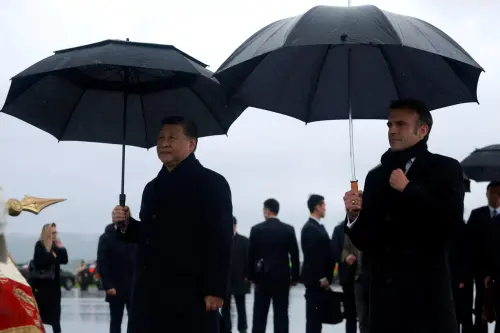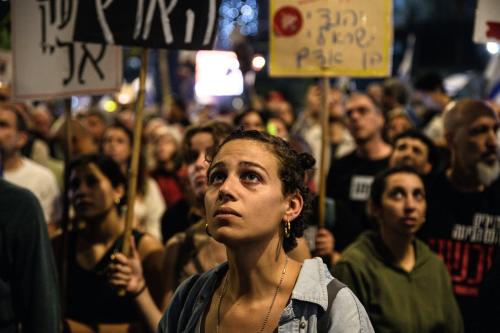Content from the Brookings Doha Center is now archived. In September 2021, after 14 years of impactful partnership, Brookings and the Brookings Doha Center announced that they were ending their affiliation. The Brookings Doha Center is now the Middle East Council on Global Affairs, a separate public policy institution based in Qatar.
KUwaiti ruler Sheikh Sabah dead at 91
Sheikh Sabah Al Ahmad Al Sabah, the ruler of Kuwait who drew on his decades as the oil-rich nation’s top diplomat to push for closer ties to Iraq after the 1990 Gulf War and solutions to other regional crises, died on September 29. He was 91.
The country on September 30 laid to rest the late ruler in funeral rites closed to the public due to COVID-19 concerns. His successor and brother, Emir Sheikh Nawaf Al Ahmad Al Sabah, 83, headed the rites after being sworn in at parliament, pledging to work for the OPEC member state’s prosperity, stability and security.
Bahrain to normalize relations with Israel
Bahrain on September 11 agreed to normalize relations with Israel, becoming the latest Arab nation to do so as part of a broader diplomatic push by President Donald Trump and his administration to further ease the Jewish state’s relative isolation in the Middle East and find common ground with nations that share U.S. wariness of Iran.
Trump announced the agreement on the 19th anniversary of the September 11, 2001, terrorist attacks following a phone call he had with Israeli Prime Minister Benjamin Netanyahu and Bahrain’s King Hamad bin Isa Al Khalifa. The three leaders also issued a brief joint statement marking the second such Arab normalization agreement with Israel in the past two months.
First direct flight from Israel lands in Bahrain
The first known direct commercial flight between Israel and Bahrain landed September 23 in the island kingdom, just a week after it signed a deal alongside the United Arab Emirates to normalize relations.
Flight data showed an Israir Airlines Airbus A320 landed at Bahrain International Airport after a nearly three hour flight from Tel Aviv’s Ben-Gurion International Airport. Hours later, Bahrain acknowledged the flight carried a delegation of Israeli officials.
Saudi Arabia reaches final verdict in Khashoggi case
A Saudi court issued final verdicts on September 7 in the case of slain Washington Post columnist and Saudi critic Jamal Khashoggi after his son, who still resides in the kingdom, announced pardons that spared five of the convicted individuals from execution.
While the trial draws to its conclusion in Saudi Arabia, the case continues to cast a shadow over the international standing of Crown Prince Mohammed bin Salman, whose associates have been sanctioned by the United States andUnited Kingdom for their alleged involvement in the brutal killing, which took place inside the Saudi Consulate inIstanbul.
Saudi dissidents form party, push for reform
A group of Saudi dissidents, most of them in exile, on September 23 announced the formation of a party to push for political reform in Saudi Arabia in defiance of de facto ruler Crown Prince Mohammed bin Salman who has moved to crush any dissent.
The world’s top oil exporter and U.S. ally is an absolute monarchy without an elected parliament or political parties. Past attempts to organize politically in the Gulf state in 2007 and 2011 were suppressed and members were arrested.
Mecca to open for prayer and pilgrimage
Saudi Arabia on September 22 said Muslims would be allowed to perform the smaller, year-round pilgrimage starting October 4 as the kingdom gradually begins lifting restrictions that had been in place on Islam’s holiest site for the past seven months due to the coronavirus.
State media reported the government plans to allow up to 6,000 visitors a day at the sprawling Grand Mosque in Mecca, which will be open to Saudi citizens and residents only during this first phase.
Afghan, Taliban peace talks resume in Doha
Afghanistan and Taliban peace talk negotiators held their first direct session on September 15 in Doha, their spokesmen said, as the warring sides try to work out an agenda and schedule for how to negotiate a peace deal as the United States withdraws troops.
Talks between the two sides were to begin shortly after a U.S.-Taliban agreement in February, but started only after months of delays, caused in part by continuing Taliban offensives in the war-torn country as well as disagreement over the release of prisoners.



Commentary
GCC News Roundup: Kuwaiti ruler dies, Bahrain normalizes relations with Israel (September 1-30)
October 5, 2020